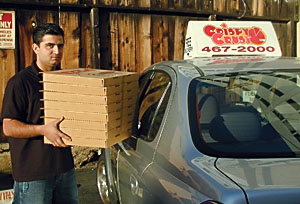Why? Because they don't have a commercial auto policy, which is required for any driving that is done for "business purposes".
If your employer lets you use a company car, then they are responsible for paying to insure it. You have nothing to worry about, since you are covered in the event of an accident while on the job. However, some companies expect employees to use their own vehicles when they’re on company business. This gray area between business and personal use raises a number of questions, and you don’t want to be without the proper coverage if you are involved in a car accident. It can get expensive!
If you don’t actually deliver a product, what constitutes “business purposes”? Some insurance companies define it as transporting goods for money. That could include activities such as:
- Daycare/church bus or van services
- Door-to-door consulting services
- Catering
- Landscaping or snowplowing services
A good rule of thumb is if you’re using your car more than 50 percent of the time for business (to make money), then you probably need a commercial auto policy.
If you drive around all day making sales calls, you may only need to increase the liability limits on your personal auto policy. However, if you get direct compensation from the use of your car, such as making deliveries or using it as a taxi service, then you need a commercial auto policy. It may mean higher rates, but if you fail to divulge this to your insurance company and then you’re involved in an accident, the company may deny your claim if it discovers you withheld that information.
Using a Personal Car on Company Business
Big companies typically have commercial auto policies that cover employees while they’re traveling on company business. If you have an accident in this situation, you may have to file a claim with your own insurance company, but it’s also possible your employer’s insurance will pay. Check with your employer AND your personal insurance agent in advance so that you know where to turn in the event of an accident. You don’t want to be caught in the middle while the two companies point fingers at each other!
If you have an accident while on a business trip in your own car, make sure the insurance adjuster is aware that was a business-related trip. Your personal auto insurance provider shouldn’t deny your claim just because you were on a business, although it may try to recover the money from your employer’s insurance company.
How do you know if you need commercial vehicle insurance?
Here are some important questions:
• What are your limits on liability? A commercial auto policy offers higher liability limits because a company has more assets to protect than most individuals, so the limits need to be higher. In addition, most commercial vehicles are larger than passenger vehicles, so they can cause more damage. If you have a large commercial-type vehicle that you use for work purposes, then you probably need a commercial automobile policy.
• Will your insurance policy cover damage your vehicle causes while you’re on the job? While a personal policy won’t, a commercial policy will.
• Do you have employees who drive your vehicle? If other people drive your vehicle for any work purposes, you need commercial insurance.
You also need a commercial automobile policy if the vehicle hauls tools or equipment weighing more than 500 pounds, makes deliveries or requires filings for interstate for-hire trucking businesses.
Don’t be caught driving a personal car for business-related activities while only carrying a personal auto insurance policy. The cost may be less, but if you are in an accident and it is determined to be work-related, your claim will be denied. That will end up costing you many times more than the commercial rate you would’ve been paying!
If you would like to find out if you need commercial auto insurance, one of our SAV-ON Insurance agents would be happy to help. Call 1-888-867-2866.
Sources: www.carjunky.com, www.insure.com, www.irs.gov



No comments:
Post a Comment